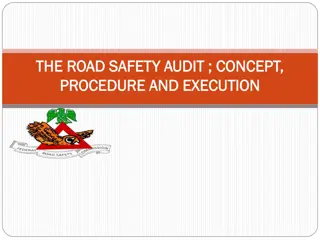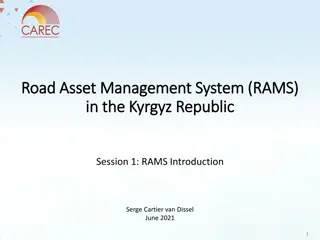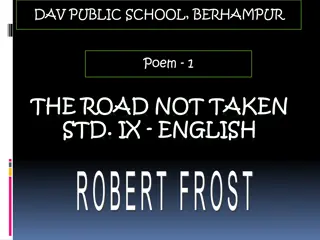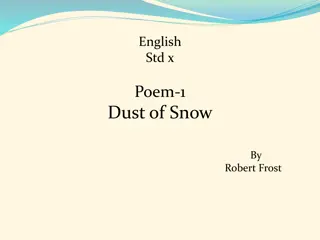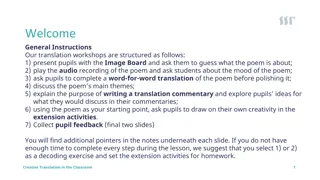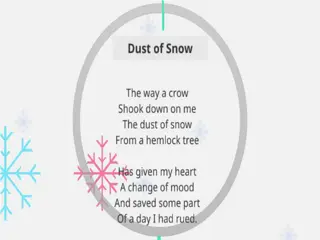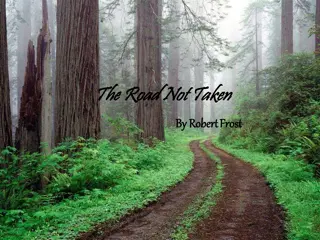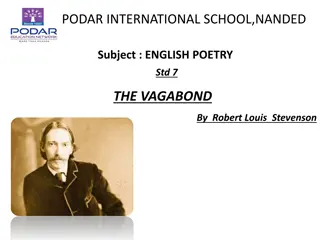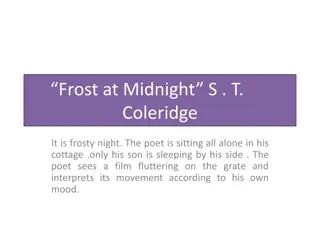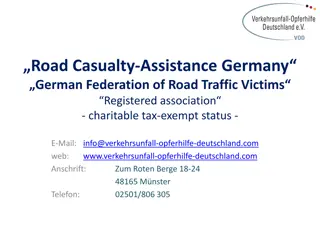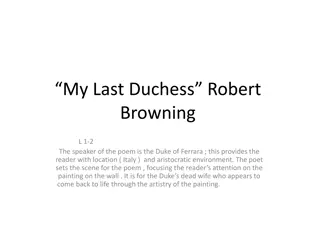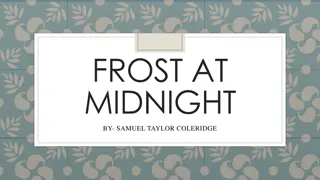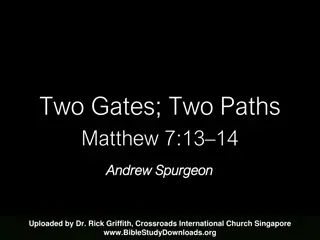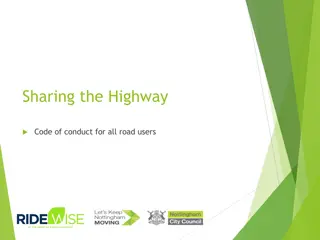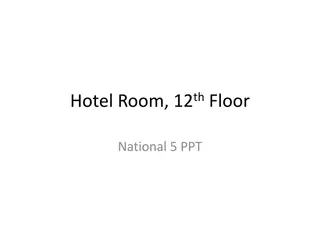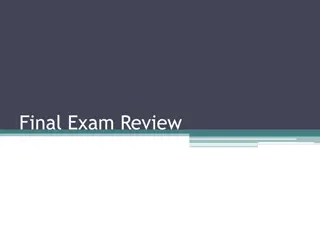Analysis of Robert Frost's Poem "The Road Not Taken
This content prepared by Ms. C. Sasikala, an Assistant Professor of English, delves into the analysis of Robert Frost's renowned poem "The Road Not Taken." It provides an in-depth examination of the author's background, the impact of his works, themes in his poetry, his inspiration, and the use of nature as a metaphor in his poems. Frost's exploration of human emotion and the complexities of choices is highlighted, offering a comprehensive insight into his literary genius.
Download Presentation

Please find below an Image/Link to download the presentation.
The content on the website is provided AS IS for your information and personal use only. It may not be sold, licensed, or shared on other websites without obtaining consent from the author.If you encounter any issues during the download, it is possible that the publisher has removed the file from their server.
You are allowed to download the files provided on this website for personal or commercial use, subject to the condition that they are used lawfully. All files are the property of their respective owners.
The content on the website is provided AS IS for your information and personal use only. It may not be sold, licensed, or shared on other websites without obtaining consent from the author.
E N D
Presentation Transcript
Content Prepared by Ms. C. SASIKALA Ms. C. SASIKALA Assistant Professor, Department of English, Jamal Mohamed College, Trichy 620 020.
POETRY AND ONE ACT PLAYS
UNIT-I 1. The Road Not Taken - Robert Frost
Agenda Author s Introduction Title of the poem Theme of the poem About the poem Poem Rhyme scheme of the poem Line by line explanation Moral of the poem
Authors Introduction: Author s full name was Robert Lee Frost. He was born on (1874-1963) USA. He was an American poet. His other career are Teacher, Farmer, Playwright and editor. He was much admired for his depictions of the rural life of New England. His first achieved professional publication in 1894 when The Independent, a weekly literary journal, printed his poem My Butterfly: An Elegy.
HIS IMPACT OF THE WORLD While Robert Frost was an American author, his impact can clearly the world. Frost focused his writings on the beauty of life and of nature. While Frost's language is simple, it is also very profound. Frost spoke of everyday events, common situations, and rural imagery. THEME OF HIS POETRY The main theme of his poetry is the despairing state of man in his life. In all of Frost's works, the reader sees encapsulated in verse, a depth and level of human emotion that is not easily discerned by the eye, but rather felt and nurtured in the heart be seen all over
HIS INSPIRED PEOPLE Frost met and was influenced by such contemporary British poets as Edward Thomas, Rupert Brooke, and Robert Graves. While in England, Frost also established a friendship with the poet Ezra Pound, who helped to promote and publish his work. USING NATURE IN HIS POEM Frost uses nature as a metaphor, primarily, in his poems to express the intentions of his poems. He uses nature as a background metaphor in which he usually begins a poem with an observation of something in nature and then moves towards a connection to some human situation.
TITLE OF THE POEM The title "The Road Not Taken" focuses the poem on lost the road that the speaker did not take. More than anything in the text of the poem, this title hints that the poem is about lost opportunities, and the complexities of choices, not just choosing the path that is fresh and new. opportunities
THEME OF THE POEM It's actually a poem about the journey of life. The two roads diverged in a yellow wood symbolize a person's life. The main theme of "The Road Not Taken" is that life is full of choices which will define our destinies. The speaker spends a while deliberating when he comes to a fork in the road, which symbolizes a choice he must make in his life
ABOUT THE POEM In the poem In the poem - - The Road Not Taken , the The Road Not Taken , the road symbolizes our life. The poet says road symbolizes our life. The poet says that the path that we don t choose in our that the path that we don t choose in our life is the road not taken . He describes life is the road not taken . He describes his feelings about that choice that he his feelings about that choice that he had left in the past. The path which we had left in the past. The path which we have chosen, decides our future, our have chosen, decides our future, our destination. The important message destination. The important message that the poet wants to give is that the that the poet wants to give is that the choice that we make has an impact on choice that we make has an impact on our future and if we make a wrong our future and if we make a wrong choice, we regret it but cannot go back choice, we regret it but cannot go back on it. So, we must be wise while making on it. So, we must be wise while making choices. choices.
The Road Not Taken The Road Not Taken Two roads diverged in a yellow wood, And sorry I could not travel both And be one traveler, long I stood And looked down one as far as I could To where it bent in the undergrowth; Then took the other, as just as fair, And having perhaps the better claim, Because it was grassy and wanted wear; Though as for that the passing there Had worn them really about the same,
And both that morning equally lay In leaves no step had trodden black. Oh, I kept the first for another day! Yet knowing how way leads on to way, I doubted if I should ever come back. I shall be telling this with a sigh Somewhere ages and ages hence: Two roads diverged in a wood, and I I took the one less traveled by, And that has made all the difference.
RHYME SCHEME OF THE POEM The poem, perfect rhyme scheme, 'ABAAB' is an ambiguous poem that allows the readers to think about choices they make in life. having a
Explanation of the poem Two roads diverged in a yellow wood And sorry I could not travel both The poet has come into the deep autumnal wood where two roads have diverged into two ways like a fork .Immediately the poet understands that as a traveler travelling both the roads is impossible. Here two roads are meant two ways of life. Yellow wood symbolizes the autumnal forest.
And be one traveler, long I stood And looked down one as far as I could To where it bent in the undergrowth; The poet in utter state of duality examines both the roads as he finds himself in dilemma about the choice of roads. At first he looked down the first road to the utmost to check whether it will be suitable or not. Around the bend, the undergrowth (small plants and grass) block his view. Then took the other, as just as fair, After he has looked down the road for a long time, the speaker chooses to take the other path. He means the road is just as nice as the other one
And having perhaps the better claim, Because it was grassy and wanted wear; As he is not sure, he feels it is only "perhaps" better. The poet then found the other road to have better prospect because he found the other road to be less travelled and grassy one. Though as for that the passing there Had worn them really about the same, "As for that" refers to the other path. "The passing there" refers to the people passing along that road, probably on foot just like our speaker, The speaker says that the people passing on the other path may have worn it down just as much as the path he had taken.
And both that morning equally lay In leaves no step had trodden black It is morning time. Hence the speaker is the probably among the first to travel on these paths on that day. The paths are covered with leaves, which haven't been turned black by steps crushing them. Oh, I kept the first for another day! The speaker seems to now regret his decision of choosing the other path. Is he now justifying his choice of path by saying he'll come back to the one he missed later? This is how people deal with difficult choices; They say "We can always come back and try the other option after,"
Yet knowing how way leads on to way, I doubted if I should ever come back. The speaker agrees that his hopes to come back and try the other path may not really be practical. He says how "way leads on to way" how one road can lead to another, and then another. Then one ends up very far from where you started. That is why he doesn't think he'll ever be able to come back and take that other path.
I shall be telling this with a sigh Somewhere ages and ages hence: So the speaker is probably talking of years, not months. The speaker says that he will still be telling about this decision many years later. He'll be telling it with a sigh, though, which is interesting because sighs can be happy, sad, or merely reflective and we don't know what kind of sigh this is. So, we know that this choice is probably going to be important for the speaker's future, but he doesn t know as of now if he's going to be happy about it or not.
Two roads diverged in a wood, and I This repetition helps to bring the poem to a conclusion. It reminds us what's important in the poem the concept of choosing between two different paths. The hesitation of "and I" and the dash makes the end interesting. This lets us know that whatever the speaker is about to say next is important.
I took the one less traveled by, In this line, the speaker sums up his story and tells us that he took the road less traveled by. With the hesitation in the line before, this declaration could be either triumphant or regretful. Also, remember it wasn't exactly clear that the road our speaker took was the one that was less traveled. He said at first that it looked less worn, but then that the two roads were actually about equal.
And that has made all the difference. The narrator took the path that no one else did, and that is what has made the difference in his life - that made him successful. A "difference" could mean success, or utter failure. From where he is now, just looking down the path as far as he can see, he can't tell the future He can t say if it leads him to good or bad. He just knows that his choice is important that it will make all the difference in his life.




